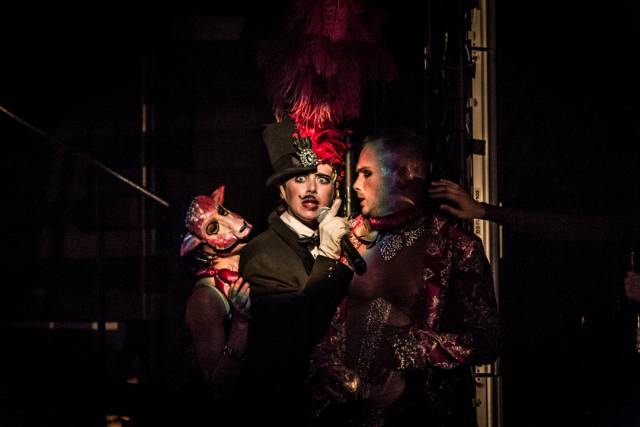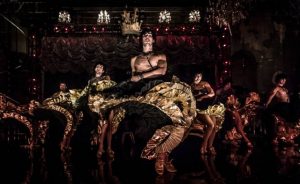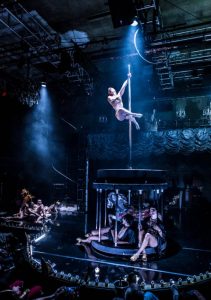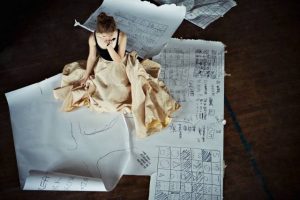

In Company XIV’s latest “baroque burlesque ballet” Paris, Charlotte Bydwell plays a dual role (quite literally) as Zeus the emcee and his other half Fifi, a shy, tuba-playing showgirl. The inventive role requires the actress to wear a half tuxedo, half gown and put on her most raunchy French accent. I speak with Charlotte about finally getting to work with the ingenious Austin McCormick (Director of Paris and Founder of Company XIV), how she’s not settling down into any one art form, and her one woman show, Woman of Leisure and Panic.
How did you get involved with this Company XIV production, Paris?
Charlotte Bydwell: Austin and I had gone to Juilliard together. He was a senior when I was a freshman. That was now ten years ago. So we’d always sort of known each other and been on each other's radar and had the intention of working on something together. But it really took this long to actually be in the same place at the same time. I had just finished my MFA at the Old Globe in San Diego so I was out of New York for a few years. When I moved back in January I got back in touch with Austin because he was still on my list of people I was dying to work with. We ended up going on a residency in June and then he suggested this crazy part of Zeus as a half man/half woman in the production of Paris and I just jumped on board so readily.
How did that crazy idea of the Zeus/Fifi duality come about?
It was totally Austin’s idea, coming off of a vaudevillian half man/half woman thing, to have this statuesque female wearing a male tuxedo and the sex appeal of that, and to incorporate that into the show somehow. Originally -- they did a version of this production a few years ago -- they had a man playing Zeus and he was sort of more like a lone ranger, kind of sad Texas cowboy character. So we took the script that had been written for that kind of a Zeus and we adapted it into this zany French emcee with a showgirl assistant who just can’t get her act together. I always adore playing comedy so it was that possibility to just get really crazy with the physical comedy and the back and forth switching, and just figuring out ways to live in the space as the two characters. It was sort of a creative playing field of amazing possibilities. Once we decided to commit to it, and had the costume made, we just went to town with how many ways it could be done. It was definitely all Austin saying, let’s just try it and see what happens.

Yeah, it was a very original, interesting addition to the part.
I think there are a lot of elements in the show with the dance ensemble where you aren't always sure who is a man or a woman. And then we have Hera, who's this gorgeous man that dressed as a woman for his first song, and then unveiling his male body. To keep that question of drag and whose gender and what is gender alive through the emcee as well, I think is an added bonus. And we get to refer to it; I use that RuPaul quote: "We’re all born naked and the rest is drag." The fact that I'm a woman in drag saying that also adds a whole other layer of interest and intrigue to the evening.
And it must be really fun for you to play both, to play into that ambiguous, androgynous layer.
Oh yeah, it’s super fun. We had moments where we thought, do we need a male voice recorded that I lip sync to? We went through different ideas about what would be the most effective way to do it. I don't have a particularly low female voice, I have quite a standard female voice, and with this French accent I'm really trying to embody this kind of lustful man, so we wondered whether that would sit well. I think it ends up being really fun for the audience to be in on the joke a little bit. And then switching into Fifi for me is just such a relief after playing this really sort of tortured male character who wants to be in charge of the world. It's a much lighter energy; it's just such a lovely performance experience.
The program credits you with some of the text. Was that written pre-rehearsal or was there any improvisation involved?
Austin and I spent the first two days of rehearsal just him and I in the studio going through all of the old text, and sort of assessing what his creative ideas were as far as these three goddesses and how that was all going to change. And then figuring out who Zeus needed to be for me to be able to play him, and then also what he needs to say to make the order of the show work. So a lot of it was just what text do we need to introduce this goddess now or to share this piece of plot with the audience and what’s the most creative way to do that. We ended up rewriting I would say maybe 60% of the text. We added in a lot of jokes that were appropriate to the Fifi/Zeus relationship because that wasn't at all in the original text so we had to create that. We did a chunk of rewriting right at the beginning and then, throughout rehearsals, I was probably going home every day and doing rewrites for an hour or two in the evenings and then coming in the next day trying to be as off-book as possible so that we could put the text right in with the dance and try to choreograph around it. So it was a pretty stressful few weeks of process in the beginning. I had to really be able to be on top of getting lines out there as soon as possible, and then trying to tweak little rewrites of those lines as we went along. But if they got too enmeshed in with the choreography then they couldn't be changed anymore. It was a really fine balance. It's not just getting the script and locking it down, there was a lot of play. We even added a line two nights ago that we think now has solved the piece, and it didn't get performed for the first two weeks of the run. So it's always changing, and I definitely do take a little bit of leeway for some improvisation at moments, but always in moments when it's really just me and it won't affect any of the timing or the dancer's movements, hopefully.

You’re a dancer, yet you do very little dancing in Paris, which is a very dance-heavy show. Was that difficult for you, or did you enjoy it?
I went to Juilliard for dance and then I spent some time with a dance company, with Monica Bill Barnes & Company, but pretty much within three years of graduating from Juilliard I was focused mostly on acting and I transitioned into working professionally as an actor and then went back to school and got my MFA in acting. So as of the beginning of this year, I've pretty much exclusively been working as an actor and a choreographer, so my dance skills are a little bit more on the back seat of my professional car right now. So it actually felt pretty appropriate for me where I'm at in my life. It's acting but it's such physical acting and it requires all of my spatial awareness and counts and musicality from all of my dance background in order to make the character and the acting choices work. In some ways, I feel like I stumbled into this gift of this company because I get to act using all of my dance background just as much as I'm interested in doing at the moment. But that's not to say that if we didn't do another show and start rehearsing tomorrow I wouldn't want to do some more dance. I'm kind of open to it all I guess. It definitely was the kind of role I was interested in working on at this point, especially because my MFA at the Old Globe was focused on classical text and Shakespeare, and so a lot of the text that we've actually ended up with was poetry and heightened language. So I'm getting to focus on those skills that I’ve just spent the last three years developing and really putting them to use. I'm also working in a dialect that is not my own, the French dialect, so I'm using those acting chops that I've just recently acquired. So that's all been really exciting.
Yet you grew up in Montreal, right? You didn't have that dialect growing up?
I did not. I may be one of the rare English Montrealers. I did speak French, I would flip flop throughout the day between the two languages very easily, but I never actually carried a French accent into my English because my parents were English. It's in my ear but it's not something I would have ever spoken with in real life.
It definitely sounded very natural when you spoke with the French accent.
It's funny, it's kind of become a bit of a niche. Most of the auditions I've had since I got back to New York in January have been in French dialect somehow. Yeah, you put that on your resume and people will actually use it. It's kind of the same as when I'm playing the tuba at one point in the show as Fifi. The tuba was my high school instrument and it's always been on my resume as a special skill. I always wondered, is anyone going to notice that? The last show that I did at the Old Globe, I played the tuba in a production of Comedy of Errors. Austin again wanted it this time around. It's proving a very useful skill. I never thought I’d use it. And actually we found the tuba for free, it was from a friend of a friend who happened to have this old tuba that was her father's and hadn't been played in decades hanging on her wall. And so we got it refurbished and used it in this production.
You seem to have a multidisciplinary approach to your work, with experience working in different media: theatre, music, television, and dance. Do you enjoy blending all of those art forms, and what do you enjoy most about that?
I think I need to bop around, it's sort of how I work. I go from the theatre process where we have these long rehearsal periods, where it's a few weeks' rehearsal and then a few weeks of a show. Once I've done something like that then I want to do something fast, like something that we write in two days and then shoot it in two days and then we have a movie -- that back and forth of energy. I think part of the reason I've worked in so many different ways is I meet people that I'm interested in working with and they work in a different world, and they bring me into their world with them. And I want to absorb their creative energy so then I get brought into these new arenas.
I also have different ideas about different projects and then try to figure out what the best medium to present it is. Like right now I have this script that I've been working on and I'm still going back and forth as to whether it's a film or it's a performance piece. Sometimes I opt to make it both and then I have a piece that lives in two worlds. And it also depends on budget and timing and things like that. I like to let the idea dictate what medium it wants to falls into and then what collaboration will be most useful to that and what media do they work in. I try to trust that the skills from each one do carry over to the other, but there's always that fear that you're watering too many lawns at the same time. That's the downfall to having your fingers in a lot of pots.

What are some of your upcoming projects?
I have this one-woman show that I've been performing for about five years now called Woman of Leisure and Panic. I did a run of it in Times Square right before we started rehearsals for Paris. It was the first time I had done it outdoors. It was a sort of installation piece. And I'm going to be bringing that to Philadelphia to the First Person Arts Festival pretty much the day after we close Paris. So I'm going to start rehearsals for that next week.
Then I have a new solo show that's the sequel to that show, which I'll be showing in New York at the end of November. I'll be in residency for it at some point next year to create the rest of it. So it's sort of three mini pieces that come together to create this sequel. That's my main project at the moment.
Woman of Leisure and Panic I wrote just coming out of Juilliard, those couple of years right after school, and it's about that key phase of emerging adulthood where all of a sudden you're sort of alone in the world, and you have a calendar, and you need to fill it and make all of these decisions about how to actually make your life and your dreams come true. So it deals with all that panic but then also the sense of freedom and ease, and the jostling back and forth between those two things. The sequel is the life phase after that when you're coming up on 30, which I am now, and it's going to be called What Am I Doing? So once you’ve filled the calendar with all these things, that you tried your best to make all these choices to make a life for yourself, when the chaos of that for a moment is quiet and you're just like, wait a minute, what am I doing? What is it all amounting to? What are all these blocks in my calendar that I've added on, where have they led me, are they leading me to where I intended to go? So that’s how the two pieces kind of speak to each other.
That sounds really interesting and very relatable.
I know! I do it now six years later when I think I've moved on to the next phase, but I'm still a woman of leisure and panic. It never really goes away and still feels relatable.
PARIS runs October 13 - November 12 at The Irondale Center (85 South Oxford St.) in Brooklyn.